Frank Cyril Tiarks OBE was an English banker.
Sir Stuart Auchincloss Coats, 2nd Baronet was a British politician and Member of Parliament for Wimbledon from 1916 to 1918 and then East Surrey from 1918 to 1922.
Lord Arthur Lennox was a British politician. He was the youngest son of the 4th Duke of Richmond.
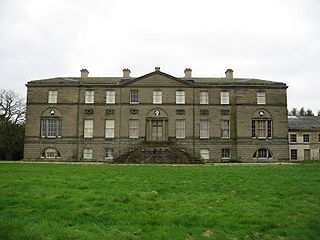
The Broughton, later Broughton-Delves, later Broughton Baronetcy, of Broughton in the County of Stafford, is a title in the Baronetage of England. It was created on 10 March 1661 for Sir Brian Broughton, of Broughton Hall, near Eccleshall, Staffordshire, High Sheriff of Staffordshire from 1660 to 1661 and the member of an ancient Staffordshire family.

Owlpen Manor is a Tudor Grade I listed manor house of the Mander family, situated in the village of Owlpen in the Stroud district in Gloucestershire, England. There is an associated estate set in a valley within the Cotswold Area of Outstanding Natural Beauty. The manor house is about 1 mi (1.6 km) east of Uley, and 3 mi (4.8 km) east of Dursley.
The Mander family has held for over 200 years a prominent position in the Midland counties of England, both in the family business and public life. In the early Industrial Revolution, the Mander family entered the vanguard of the expansion of Wolverhampton, on the edge of the largest manufacturing conurbation in the British Isles. Mander Brothers was a major employer in the city of Wolverhampton, a progressive company which became the Number One manufacturers of varnish, paint and later printing ink in the British Empire. The family became distinguished for public service, art patronage and philanthropy. Charles Tertius Mander (1852–1929) was created the first baronet of The Mount in the baronetage of the United Kingdom in the Coronation honours of George V, on 8 July 1911.
The Mander baronetcy, of The Mount, Tettenhall Wood, in the County of Staffordshire, was created in the Baronetage of the United Kingdom on 8 July 1911 in the Coronation honours of King George V, for Sir Charles Tertius Mander, English varnish and colour manufacturer and public servant.

Herbert Robin Cayzer, 3rd Baron Rotherwick, is a British landowner and estate manager. He sat as a hereditary peer in the House of Lords for the Conservative Party, from 1996 until his retirement in 2022.
Sir Charles Tertius Mander, 1st Baronet JP, DL, TD was a Midland manufacturer, philanthropist and public servant, of Wolverhampton, England.
Sir Charles Arthur Mander, 2nd Baronet JP, DL, TD was a public servant, philanthropist, and manufacturer, as managing director of Mander Brothers, the family paint, varnish and inks business established in 1773.
Sir Charles Nicholas Mander, 4th Baronet is a British baronet, historian and businessman.
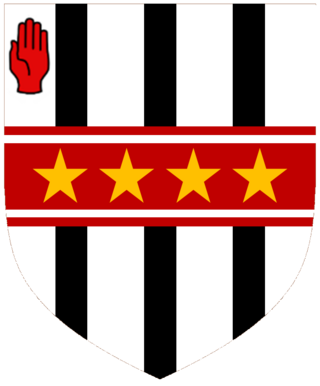
The Jaffray Baronetcy, of Skilts in the Parish of Studley in the County of Warwick, is a title in the Baronetage of the United Kingdom. It was created on 8 October 1892 for the journalist and newspaper proprietor John Jaffray. He was the co-founder of the Birmingham Post and Birmingham Mail.
Mander Brothers was a major employer in the city of Wolverhampton, in the English Midlands, a progressive company founded in 1773. In the 19th century the firm became the number one manufacturers of varnishes, paints and later printing inks in the British Empire. In the twentieth century it developed its product range in industrial coatings and inks, as well as commercial property.
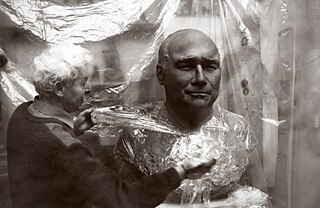
Sir William Stratford Dugdale, 2nd Baronet, was the chairman of Aston Villa from 1975 to 1978. Dugdale arrived at Aston Villa as a director when they were in the third division, having been relegated due to poor performances on and off the pitch. He left the club in 1982, the year they won the European Cup. Following several successful years as a director in the early-1970s, he was elected chairman in 1975, taking over the position from Doug Ellis, the package holiday businessman, before being replaced by Harry Kartz.
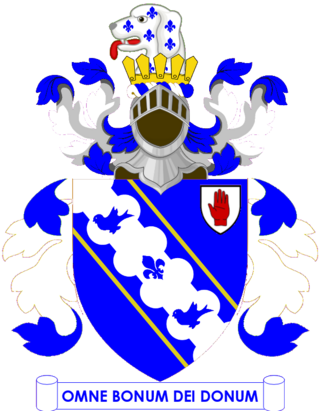
Sir Henry Edwards, 1st Baronet was an English Conservative politician who sat in the House of Commons in two periods between 1847 and 1869.
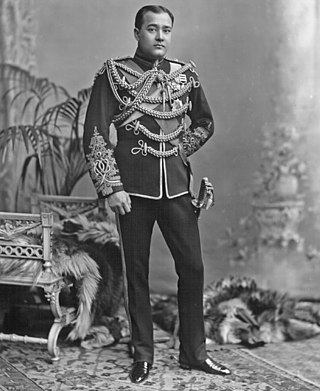
Maharaja Nripendra Narayan was the Maharaja of the princely state of Cooch Bihar, India, from 1863 to 1911.
John Mander was a British political commentator, writer, translator and poet.

Sudhira Sundari Devi Narayan of Cooch Bihar, also known as Princess Mander, was an Indian princess of the princely state of Cooch Behar, British India. She was born in Calcutta on 7 March 1894, the youngest daughter of H.H. Sri Sri Maharaja Sir Nripendra Narayan Bhup Bahadur, Maharaja of Cooch Behar, by his wife H.H. Maharani Sunity Devee Sahiba, sometime Regent of Cooch-Behar and President of the State Council.
Prativa Sundari Devi Narayan of Cooch Bihar, also known as Princess Mander, was an Indian princess of the princely state of Cooch Behar, British India. She was born at Lily Cottage, Calcutta, on 22 November 1891, the second daughter of H.H. Sri Sri Maharaja Sir Nripendra Narayan Bhup Bahadur, Maharaja of Cooch Behar, by his wife H.H. Maharani Sunity Devee Sahiba, sometime Regent of Cooch-Behar and President of the State Council.

Sir John Hay, 5th Baronet of Smithfield and Haystoun was a Scottish baronet, banker and landowner.








